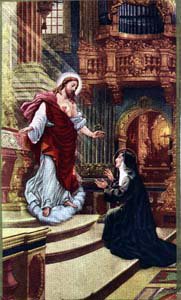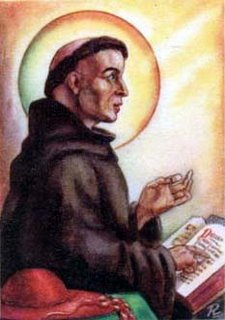February
1
Saint
Brigid was born about the year 453 at Fochard, in Ulster. When about
twenty years old she received the veil from Saint Mel, the nephew and
disciple of Saint Patrick. So many sought the religious life under
her direction that a convent, the first in Ireland, was erected for
her and she was made superior. From this parent stem branched forth
other convents in different parts of Ireland, all which acknowledged
her as their mother and foundress. Several churches in England and
Scotland are dedicated to God under her name, and some also in
Germany and in France. After seventy years devoted to the practice of
the most sublime virtups, corporal infirmities admonished our saint
that the time of her dissolution was nigh. For half a century she had
irrevocably consecrated herself to God, and during that period great
results had been attained. The day on which our abbess was to quit
this life, 1 February 523, having arrived, she received the blessed
body and blood of her Lord in the Blessed Eucharist, and, as it would
seem, immediately after her spirit passed forth, and went to possess
Him in that heavenly country where He is seen face to face and
enjoyed without danger of ever losing Him. Her body was interred in
the church adjoining her convent, bnt was some time after exhumed,
and deposited in a splendid shrine near the high altar. In the ninth
century, the country being desolated by the Danes, the remains of
Saint Bridget were removed to Down-Patrick, where they were deposited
in the same grave with those of Saint Patrick. Their bodies, together
with that of Saint Columba were translated afterwards to the
cathedral of the same city, but their monument was destroyed in the
reign of King Henry VIII. The head of Saint Bridget is now kept in
the church of the Jesuits at Lisbon.
The
Introit of the Mass:
“Thou
hast loved justice and hated iniquity; therefore, O God, Thy God hath
anointed Thee with the oil of gladness above Thy fellows. My heart
hath uttered a good word. I speak my works to the King.” Glory be
to the Father, and to the Son, and to the Holy Spirit. As it was in
the beginning, is now, and ever shall be, world without end. Amen.
Prayer
Give
ear to us, O God our Saviour, that, as we celebrate with joy the
solemnity of blessed Bridget Thy virgin, so we may improve in the
affection of piety. Through Christ, Our Lord, Amen.
Epistle:
2
Corinthians 10:17-18; 11:1-2
Brethren:
He that glorieth, let him glory in the Lord. For not he who
commendeth himself is approved, but he whom God commendeth. Would to
God you could bear with some little of my folly, but do bear with me.
For I am jealous of you with the jealousy of God. For I have espoused
you to one husband that I may present you as a chaste virgin to
Christ.
Gospel:
Matthew 25:1-13
At
that time Jesus spoke to His disciples this parable: Then shall the
kingdom of heaven be like to ten virgins, who, taking their lamps,
went out to meet the bridegroom and the bride. And five of them were
foolish, and five wise; but the five foolish, having taken their
lamps, did not take oil with them, but the wise took oil in their
vessels with the lamps. And the bridegroom tarrying, they all
slumbered and slept. And at midnight there was a cry made: Behold the
bridegroom cometh, go ye forth to meet him. Then all those virgins
arose and trimmed their lamps. And the foolish said to the wise: Give
us of your oil for our lamps are gone out. The wise answered, saying:
Lest perhaps there be not enough for us and for you, go you rather to
them that sell, and buy for yourselves. Now whilst they went to buy,
the bridegroom came, and they that were ready went in with him to the
marriage, and the door was shut. But at last came also the other
virgins, saying: Lord, Lord, open to us. But He answering said: Amen
I say to you, I know you not. Watch ye therefore, because you know
not the day nor the hour.
--
Goffine’s Devout Instructions











